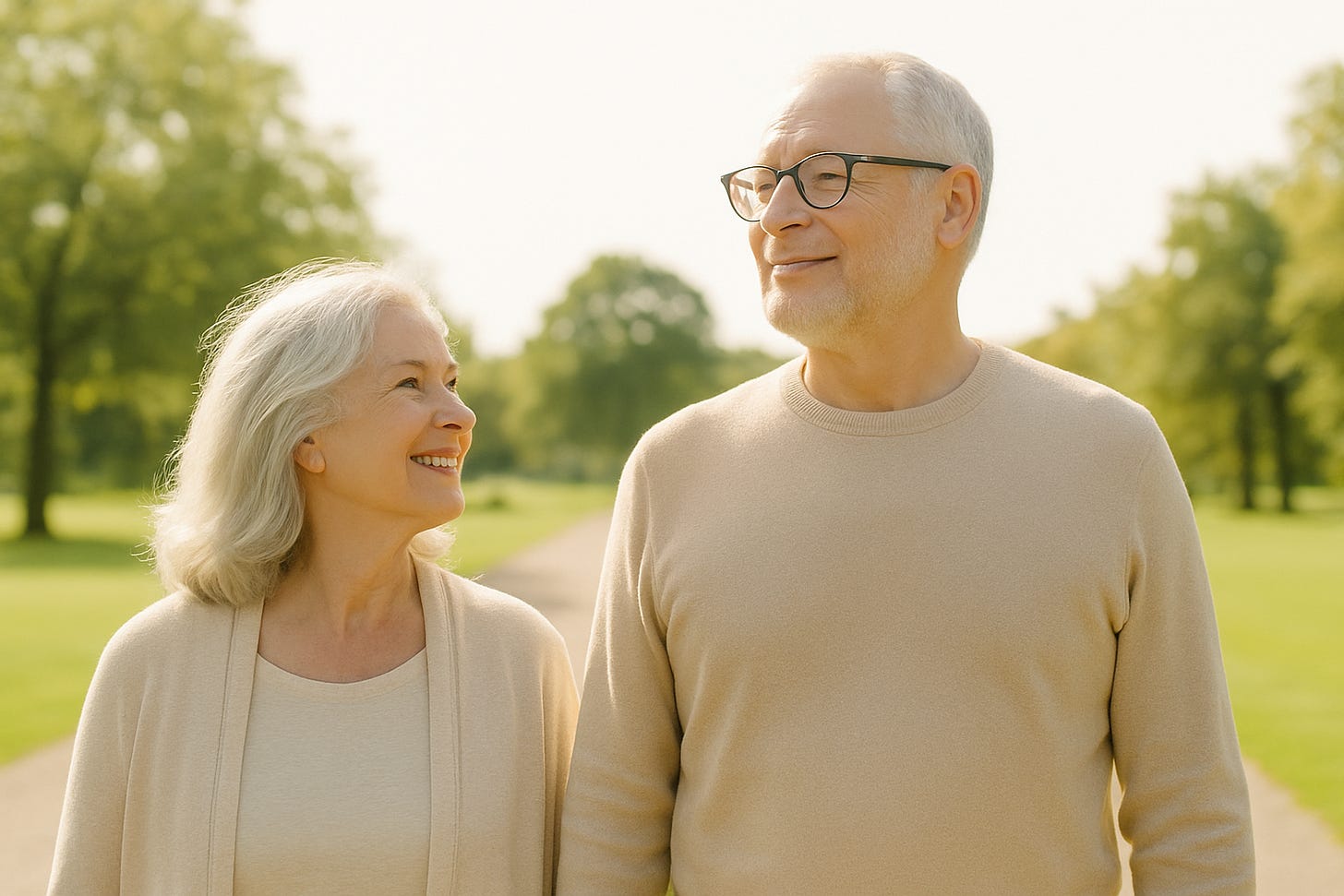The 4 Essentials of Aging Well
How Strength, Balance, Sleep, and Connection Keep You Thriving After 60
What “Aging Well” Really Means
Aging well isn’t about pretending we’re still young. It’s about protecting what makes life worth living — independence, energy, and joy.
Most of the time, it’s not one big change that keeps us healthy, but a handful of small choices that quietly add up. Over the years, I’ve noticed that nearly everything we talk about at Healthy Seniors — from balance to better sleep — connects back to four things.
We call them the four essentials of aging well: Strength, Balance, Sleep, and Connection.
They’re what keep you moving easily, thinking clearly, and feeling like yourself. When one weakens, the others strain to keep up — but when they’re in sync, life just flows better.
💪 Essential #1: Strength — Everyday Power
Strength isn’t about lifting heavy weights or hitting the gym. It’s about carrying groceries, standing up from a chair, or reaching for the top shelf without hesitation.
After 60, our muscles naturally lose some of their strength each decade. That’s what makes stairs feel steeper or jars harder to open — not age itself. The encouraging part? You can rebuild it, gently and steadily.
Try these “micro-strength” habits:
Do 10 slow chair squats before breakfast.
Keep a resistance band by the couch for a few TV-time rows.
Turn chores into exercise — lift the laundry basket with bent knees, walk the long way around the house, reach for that shelf on your toes.
Don’t worry about intensity. A few mindful minutes each day build strength that lasts. The goal isn’t to get fit for your age — it’s to stay capable for your life.
⚖️ Essential #2: Balance — The Skill That Keeps You Free
Balance is more than coordination; it’s confidence. It’s walking across the room without thinking about every step, or heading out for a stroll without scanning the sidewalk for hazards.
Falls are the leading cause of injury for older adults, yet many can be prevented. Working on balance protects your body — and restores that easy, natural way of moving that makes you feel like you again.
Try this quick test: stand near a counter, lift one foot, and see how long you can hold it. Less than ten seconds? That’s your sign to practice a little each day.
Ways to build balance:
Walk heel-to-toe down the hallway.
Stand on one foot while brushing your teeth.
Try Tai Chi or gentle yoga — both proven to improve steadiness.
Move with awareness. Feel your feet meet the floor when you stand, turn, or step.
Balance doesn’t fade because we age. It fades when we stop using it.
🌙 Essential #3: Sleep — Your Built-In Repair System
Sleep is when everything repairs itself — muscles rebuild, the immune system resets, the brain clears out its daily clutter.
Yet nearly half of older adults have trouble staying asleep or wake too early. That’s not “just aging” — it’s often about routine and environment.
A few small shifts can help:
Go to bed and wake up at the same time each day.
Dim the lights and stretch or read quietly before bed.
Keep the room cool — around 65°F (18°C) works best.
Follow the 3-2-1 rule: no food 3 hours before bed, no screens 2 hours before, no heavy talk 1 hour before.
If you wake often, skip the clock-checking. Breathe slowly. Picture your body settling deeper into the mattress with each exhale.
Sleep isn’t something to chase — it’s something to allow.
💬 Essential #4: Connection — The Heartbeat of Healthy Aging
You can eat right, move daily, and still feel off if you’re lonely. Connection is what keeps the heart — and the rest of you — alive.
Loneliness can harm health as much as smoking 15 cigarettes a day. But connection strengthens everything: mood, memory, and even the immune system.
Simple ways to stay connected:
Call or text a friend every day, even briefly.
Join a walking group, book club, or volunteer shift.
Take a class or start a hobby — learning together builds confidence.
If you’re caring for someone, find fellow caregivers who understand the ups and downs.
We don’t grow old and stop connecting. We stop connecting, and that’s when we feel old.
🌱 Building the Essentials Into Daily Life
You don’t need a full overhaul. Try one small action from each area this week:
🌱 Start Small:
Strength — 10 chair squats before coffee
Balance — Stand on one foot brushing your teeth
Sleep — Turn off screens two hours before bed
Connection — Call a friend tomorrow
Write them on a sticky note and keep it where you’ll see it — fridge, bedside, or phone case. Each checkmark is a quiet promise kept to yourself.
Before long, you’ll notice small shifts: steadier mornings, brighter mood, fewer stumbles, deeper rest.
That’s aging well — a life that feels steady, supported, and fully yours.
💙 Before You Go
Which of these four feels strongest for you right now — and which needs a little more care?
Share in the comments. Your story might be exactly what someone else in the Healthy Seniors community needs to hear today.
PS: We’re collecting real stories from readers about what aging well looks like in everyday life. If you’d like to share yours, just hit reply — we’d love to feature you.



Thanks for this timely reminder.
One thing that seems to help my wife and I sleep better is 3 grams of glycine about 1-2 hours before bed. It’s not a drug, and it’s in some common foods. It’s an amino acid that occurs naturally in the body. Do your research. I’m not a doctor, yada yada yada.